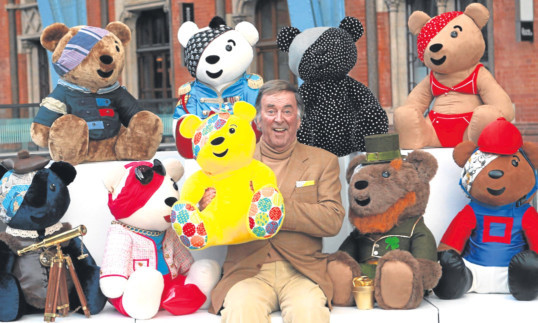The death of another household name, at an age before decrepitude had set in, has left the nation in mourning once more.
Terry Wogan or Sir Terry as he was from 2005 was 77 and working up until three months ago.
Like David Bowie and then the actor Alan Rickman, he decided not to tell the world about his cancer diagnosis, apparently blaming his sudden absence from work on a bad back.
Not just his fans but close associates too were shocked to hear he had died.
His friend, the newspaper diarist John McEntee, said Wogan was fiercely private and would not have wanted the attention.
“He would have thought, ‘I am going to die and I am not going to make a fuss’.”
Even if you never woke up to Wogan, as millions of Radio Two fans did when he hosted his long-running breakfast show, it was impossible to miss him.
In a broadcasting marathon spanning 50 years, he never seemed to fall out of (or into) fashion and was the only real reason for watching a host of silly shows (Blankety Blank and the Eurovision Song Contest to name just two).
His appeal lay in his legendary Irish charm, of course but also in his twinkly-eyed common touch; true devotees said they felt he was their friend and, regardless of his stardom, he never lost respect for his audience.
The tributes over the past couple of days have been notable for two reasons. First, no one has a bad word to say about him.
This is possibly because he was in private, as he appeared in public, a thoroughly decent chap, completely lacking in celebrity egotism or pomposity.
But also, it could have something to do with the number of pals he had in the press. I must have been one of the few journalists who never went to lunch with him but those who did have rushed to print.
They describe lengthy sessions in lovely restaurants, basking in his bonhomie and knocking back the best wine in the house.
Not only was he great company, he was also a devoted husband married to the same woman for 50 years and a loving father, who reportedly said “I’ve always taken risks with my career but never with my family”.
The other rather remarkable thing to emerge from all the column inches is the lack of controversy in Wogan’s life. For a BBC man of his era he rose to fame in Britain in the 70s that is no minor accomplishment.
Despite having a high profile platform for five decades he never told us how to vote or what to think. He has been described as probably a “fairly traditional Tory” by one of his lunchtime companions and by another as “something of a friend” of Margaret Thatcher’s but not even the newspapermen he befriended were really privy to his political opinions or his religious convictions (he said he lost his faith when his first child died but a priest from Ireland was with him in his last days).
How refreshing Wogan was among today’s talking heads, a motor mouth maybe but one who teased rather than tormented and deployed his wit without malice.
That is not to say he was anodyne. He was said to have denounced the ghastly Jonathan Ross and Russell Brand, a sub species of broadcasting, for their rudeness on air to the actor Andrew Sachs and his granddaughter.
And he openly deplored true villains, such as Jimmy Savile. “He always struck me as creepy”, Wogan said of the former colleague who he believed had “poisoned” the BBC.
He was also slightly catty although even that sounds too strong a word about the current generation of untalented and easily replaceable, talent on the television. And he was unsympathetic to older women who complained about an ageist BBC.
“I think a number of people who have been protesting originally got the jobs because of their glamour,” he said in an interview two years ago. “It is a visual medium.”
He was even mildly critical of the employer he loved, particularly of the greed of the corporation’s managers and its overpaid stars (which must have included him).
However, he could have made much more mischief than he did, with his legions of TOGS (Terry’s Old Geezers and Gals) hanging on his every word.
That he chose not to may explain why he survived half a century in a competitive and backbiting milieu seemingly without making a single enemy.
One of his oldest friends, the Radio Two presenter Ken Bruce, said he was “exactly the same” on or off the air, “he didn’t live for being an entertainer”.
Perhaps that is the secret to why he was the most consummate one of them all.
